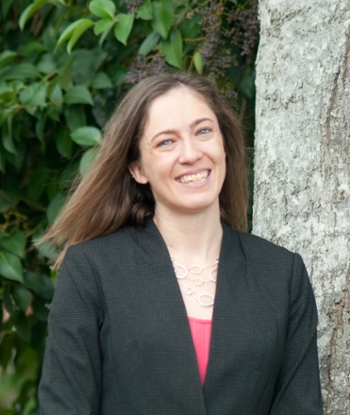News & Events
Student Spotlight: Amelia Coffman, Psychology
Doctoral candidate conducts research on eating disorders after surviving anorexia and bulimia

Amelia Coffman, a doctoral candidate in social psychology, conducts research on eating disorders to find more effective ways to understand and control them because she lived inside the vicious cycle of an eating disorder.
When she was about three years old, Coffman began taking ballet lessons. As she entered college, her devotion to ballet became more serious and she believed that to be the best ballerina she could be, she had to be thin.
But the thinner she became, the less stamina she had to keep up with her fellow dancers. Eventually she became too thin and weak to do some of the ballet steps.
Soon after that, she started missing days of her college classes at Texas A&M University because she was too weak to get out of bed.
Anorexia and bulimia had taken hold of her body and mind. It would take a decade for Coffman to learn how to effectively manage her eating disorders, continue her education and move forward in her life.
Today, Coffman is nearing completion of her doctorate in social psychology from CLASS. She plans to use her degree to research eating disorder treatments in order to improve them and to speak publically about eating disorder recovery.
“I want to use my experience with an eating disorder to help find better answers for the very problems I experienced,” Coffman says. “I really want to show everyone affected by an eating disorder that full recovery is possible, even if it’s not easy.”
As an undergraduate student, Coffman tried to balance her coursework with her dancing schedule – a challenging task since most days she was dancing up to eight hours a day. Her eating disorder worsened, and resulted in intermittent hospitalizations, which, in turn, pushed back her undergraduate graduation.
“I went to a number of inpatient hospitals where I would stay for a few months, and in between the hospitals I had a treatment team—a psychiatrist, therapist, dietitian, and several medical doctors—and they oversaw my treatment,” she says.
Her friends and family grappled with how to help her as she experienced relapse after relapse.
“They struggled beyond words every time I got back from months at a hospital ‘recovered’ and yet relapsed even more severely only months later. I couldn’t really be a friend to anyone during those years—my ‘friend’ was the eating disorder,” she says.
After graduating from A&M in 2007, two years later than she originally planned, Coffman wanted to attend graduate school, but her illness prevented that from occurring. At that point, she became fed up with the ongoing struggle and set her sights on victory. Her first step was to move to Houston for intensive treatment. Her second step was to give up ballet for good.
“I recognized that ballet was very dangerous for me, and I reluctantly gave up my Pointe shoes,” she says. “Also, always being in a room full of mirrors where everyone is very thin is not healthy for me.”
Coffman chooses her words carefully when discussing her battle with her eating disorder - she doesn’t want to be a trigger for anyone else’s relapse.
“I was in danger of dying—as many people are,” says Coffman. “I am cautious of saying too much because people with eating disorders can be very competitive— even if it is unhealthy competition, but I can share what one of my therapists said. She told my new therapist in Houston, ‘Amelia is on her ninth life. She has no more. This is her last chance to live.’”
It was such comments which caused her to finally realize how severe her problem was.
“I was sick of having something outside myself controlling my life so severely – including my ability to go to grad school,” she says. “I moved to Houston from College Station right after graduating from Texas A&M because there are great doctors here. I focused on my recovery full-time. By 2009, I was well enough to apply to grad school at UH, and by 2010, I was well enough to begin classes.”
At UH, Coffman earned her M.A. in psychology in 2013. Now, as a CLASS doctoral student, Coffman is training as a statistician and psychometricist with an emphasis in item response theory. She is on track to graduate in December.
“I took Statistics for Psychology, and then Methods my first semester as a psychology undergraduate and I loved them! Everyone else in the classes hated them and struggled to pass— I loved it and made straight A’s. I realized that I experienced those classes very differently, and that I should look into being a statistician. That led me to my current program, where I focus heavily on statistics and psychometrics in psychology,” says Coffman.
Her dissertation, however, was inspired by her personal experience. Coffman’s current research looks at the process of recovery from an eating disorder from a social psychological perspective.
“Amelia is addressing a common obstacle or challenge to recovery in her study of the ‘abstinence violation effect,’ which can lead to setbacks and loss of hope when an eating disorder behavior occurs as part of the learning process. Understanding this effect can help clinicians and patients cope with setbacks in a proactive way,” says Dr. Theresa Fassihi, founder and executive director of the Houston Eating Disorder Center and a member of Coffman’s dissertation committee.
That research is currently ongoing and she invites individuals interested in participating in her study to visit www.edstudy.net.
“I have been impressed with Amelia’s courage and dedication to work on an eating disorder research topic,” adds Dr. Fassihi. “In addition to her important research, Amelia also donates her time to speak to patients and families in treatment to help them see that people can recover fully and that they can be hopeful about putting the illness behind them, as she has. She is an inspiration.”
- By Monica Byars